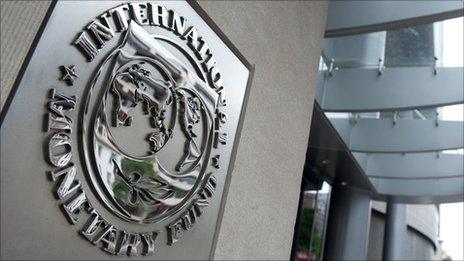Lagarde favourite for IMF as Mexican enters fray
- Published
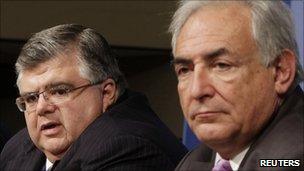
Mr Carstens (left) is the first non-European to throw his hat in the ring after Mr Strauss-Kahn's departure
Mexico's finance ministry has said it will nominate the country's central bank boss, Agustin Carstens, to head the International Monetary Fund (IMF).
France's finance minister, Christine Lagarde, is favourite to take the job.
However, Mr Carstens may hope to benefit from a backlash among developing countries against Europe's historic domination of the position.
The previous head - Frenchman Dominique Strauss-Kahn - quit last week to fight sexual assault charges in New York.
The Mexicans' announcement on Sunday came a day ahead of the formal opening of nominations, with a deadline of 10 June set by the IMF, external for all candidates to be put forwards.
A shortlist of three will then be drawn up over the following week, from which the Fund's executive board will choose the new head by 30 June.
'Undermined'
Mr Carstens was deputy managing director at the IMF up until 2006, external, and before that, represented Mexico, Spain, Venezuela and Central America at the Fund.
The Mexican finance ministry said their man had "the abilities and qualifications needed to lead an institution of the relevance of the International Monetary Fund".
South Africa and Australia have said the next managing director of the International Monetary Fund should be appointed on merit and not nationality.
The body has always been headed by a European, and the pair say the current appointment system undermines the IMF's legitimacy.
"For too long, the IMF's legitimacy has been undermined by a convention to appoint its senior management on the basis of their nationality," Australian Treasurer Wayne Swan and South African Finance Minister Pravin Gordhan said in a joint statement.
"In order to maintain trust, credibility and legitimacy in the eyes of its stakeholders, there must be an open and transparent selection process which results in the most competent person being appointed as managing director, regardless of their nationality."
The duo are co-chairs of the G20's (Group of 20 leading rich and developing countries) IMF Reform Working Group.
Emerging economies have been calling for an end to Europe's traditional grip on the IMF leadership post.
Former South African finance minister Trevor Manuel also has been raised as a possibility, although he has yet to throw his hat in the ring.
'Distinguished'
European leaders appear to be rallying behind Ms Lagarde as a common candidate, with the Dutch government becoming the latest to endorse her on Monday.
The British chancellor, George Osborne, said Ms Lagarde would be elected on a "merit-based candidacy, as she's been an outstanding finance minister and has chaired the G20 finance ministerial meetings this year in an effective and consensual way".
More significantly, Germany has also voiced support, seemingly ruling out the chances of two mooted German contenders - Finance Minister Peer Steinbrueck, and former Bundesbank head Axel Weber.
BBC Berlin Correspondent Steve Evans says Ms Lagarde has now also been endorsed "by the two people who matter in the German government".
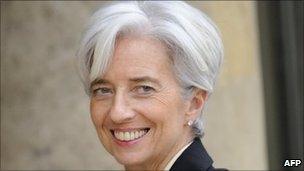
If given the job, Christine Lagarde would become the IMF's first female leader
Chancellor Merkel said Ms Lagarde was "distinguished" and "very experienced", and the finance minister, Wolfgang Schaeuble, told the Bild on Sunday newspaper that she was "outstandingly qualified" and "extremely respected and appreciated in the entire financial world."
Mr Schaeuble told the German newspaper: "The US and Europe pay by far the biggest share of the contributions.
"It's like in a publicly traded company: Those who hold the majority of shares will also get to name the chairman."
However, some have raised concerns that Ms Lagarde may face imminent legal issues of her own.
She faces a possible investigation of her role in sending to arbitration a 385m euro ($539m; £335m) payment settlement from the government to businessman Bernard Tapie in 2007.
The French court of justice is to decide by 10 June - the same day as the close of nominations for the IMF - whether to launch an investigation against Ms Lagarde for abuse of power.
Voting rights
Mr Strauss-Kahn was the fourth Frenchman to have held the IMF's top job.
He is in New York on bail awaiting trial for sexual assault and attempted rape, charges he denies.
In their statement Mr Swan and Mr Gordhan said G20 leaders wanted to reforming international financial institutions, including the IMF and the World Bank.
Developed industrialised countries currently control about 57% of the voting rights in the IMF, compared with about 43% for developing nations.
With the recent emergence of Brazil, Russia, India and China, many other global figures - including the head of the Organisation for Economic Co-operation and Development - had also called for the IMF job to go to a non-European.
The appointment is usually decided unanimously by the IMF's executive board, although a majority vote by the board would be enough to choose the winner.
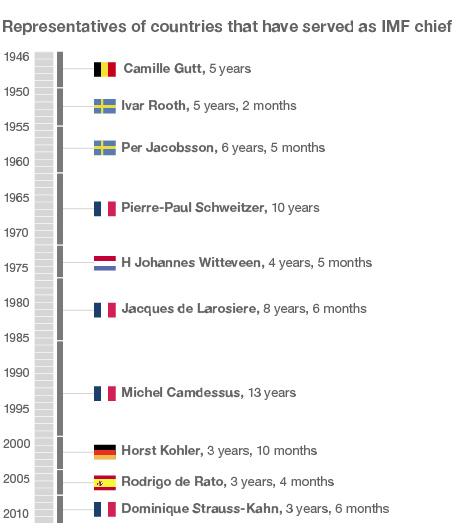
- Published22 May 2011
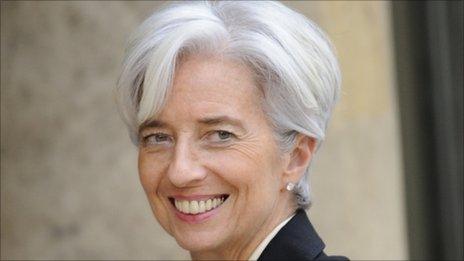
- Published19 December 2016
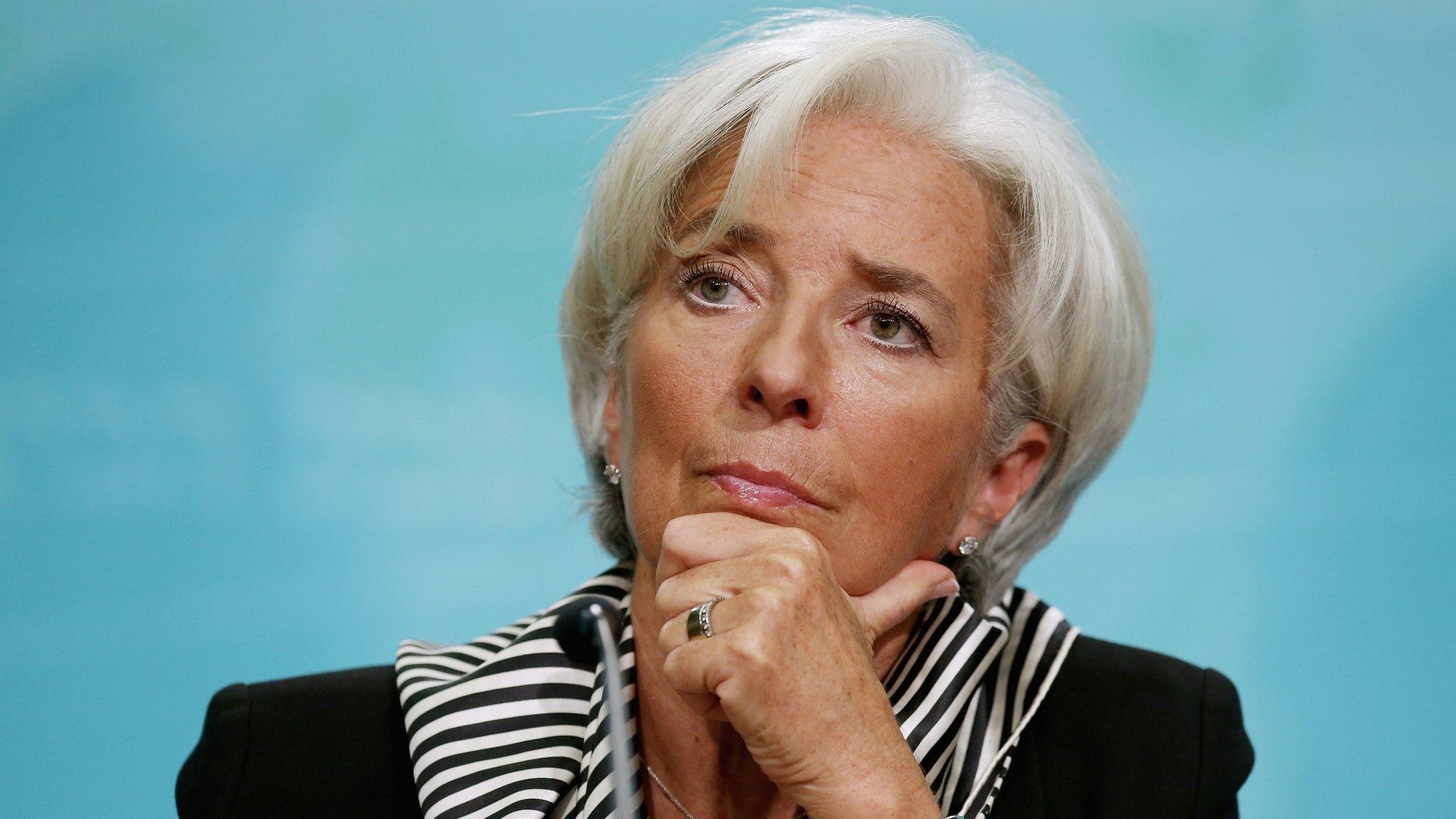
- Published20 May 2011
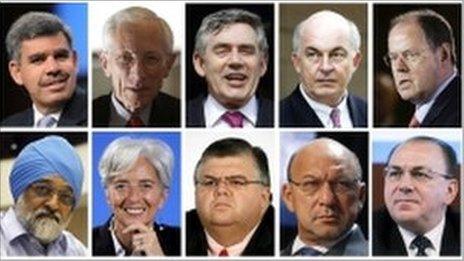
- Published10 June 2011
